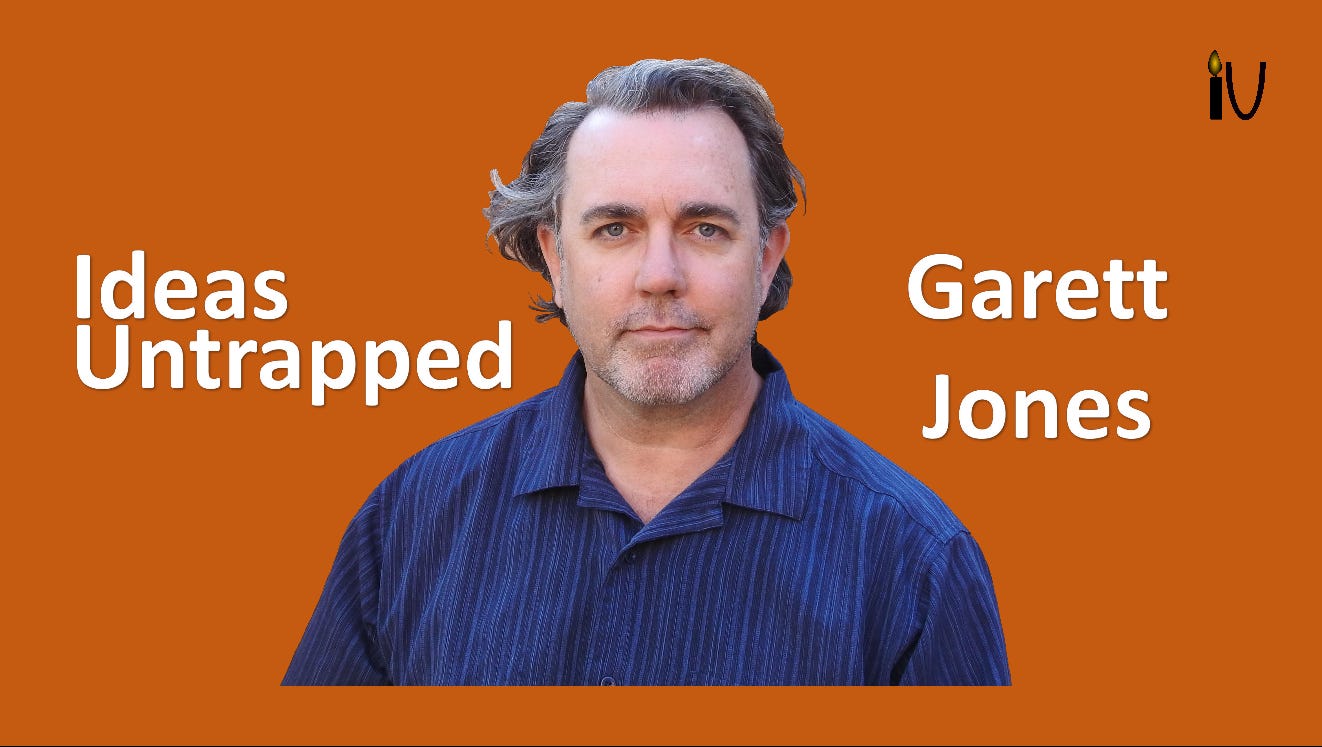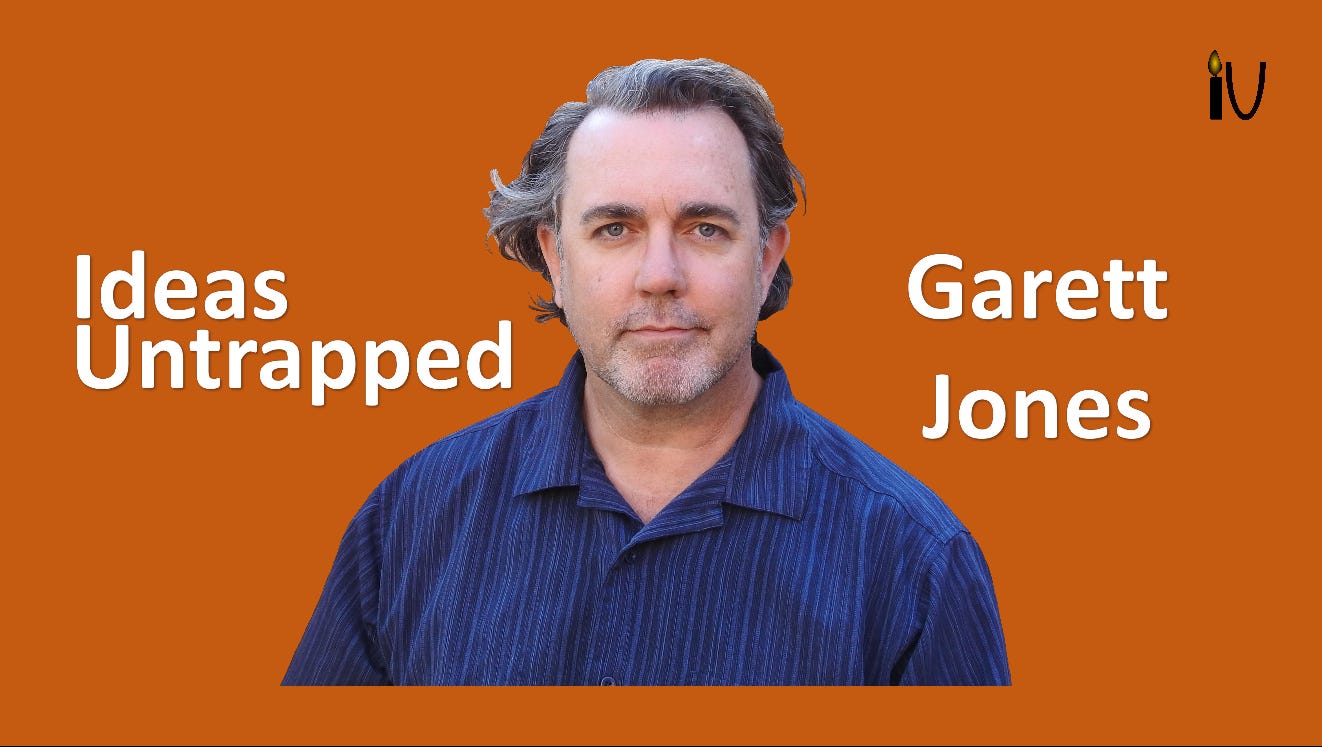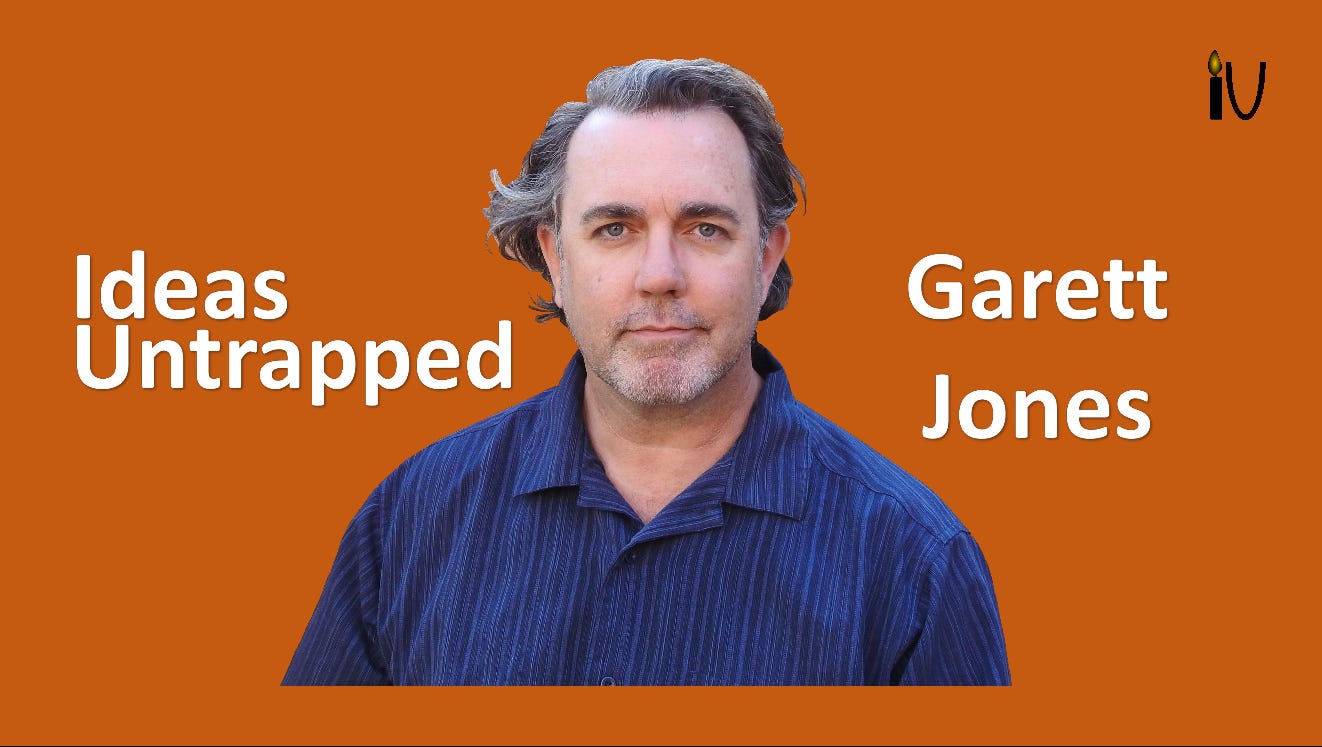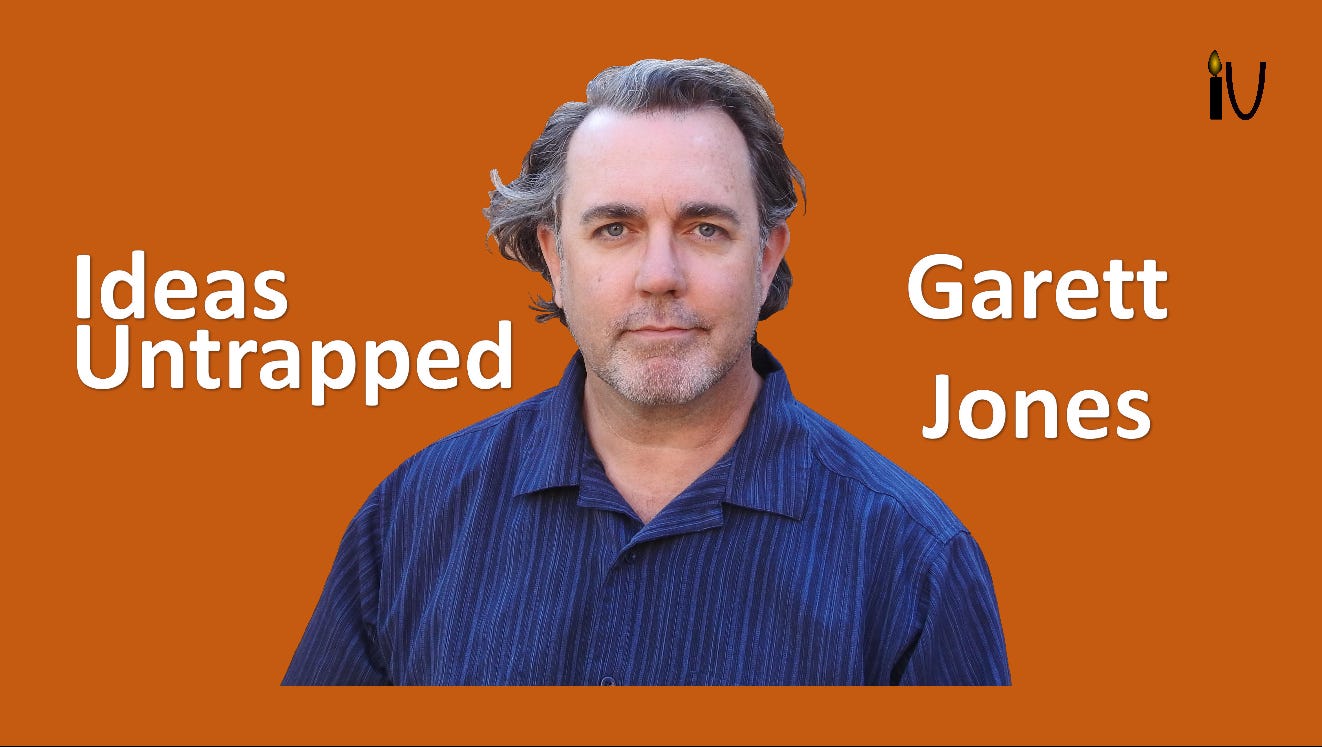
Garett Jones is one of the smartest people I have ever talked to - and he is at his usual brilliant best in this conversation. We started by trying to see how his latest book fit into the context of less developed countries with weak rule of law. I have often remarked that Garett is underrated as a development economist. I still think so.
You can listen or download to the podcast on any platform of your choice (some links here), and you can also rate us here.
Transcript
Tobi: WeIcome to Ideas Untrapped and today I am on with economist, Garett Jones. Garett Jones is a professor of economics at George Mason University and he has written two excellent books "Hive Mind" and "10% Less Democracy". Welcome, Garett.
Garett: Thanks very much for having me, Tobi.
Tobi: Thinking on the margin is something I admire so much which is what you did quite well in your latest book 10% Less Democracy. Are economists just better at this than everybody else, and if yes, why?
Garett: You're right. I do try to do that a lot in the book. I agree with you, Economists, I think, are better at this than other social scientists because it's just so much a part of our training. It's so normal for us to think, do you want to buy two more peanut butter sandwiches or two fewer? Should this company hire three more workers or fire two workers? So that kind of marginalist thinking which is where... the Marginal Revolution of the 19th century embodies that. Yeah, that really helps us think about big social questions in a very productive way. When I applied this to democracy what I realised it was quickly, something that a lot of people know, which is that all of the things we call democracies are a blend of democracy with oligarchy of one form or another. So getting the balance right is more important than an all-or-nothing question. All or nothing is off the table, thank goodness, but getting the blend right between insiders and outsiders, between elite and the masses, that's something that can be evaluated and fortunately, my economist friends have evaluated it.
For some people, they'll quite naturally assume that democracy means an independent judiciary, the rule of law, impartial, fairly uncorrupt government. And those things are not democracy. They are good things but they are not democracy. - GJ
Tobi: So given all the trade-offs that are involved with social decisions and reforms, how can we be better at thinking on the margins? We live in an era of protest movement where people want sweeping changes and that's not really how society works, so how can people better train themselves to be marginalist thinkers?
Garett: Yeah, you're right. There aren't that many questions where we have to go all or nothing. Most policy questions can be a question of incrementalism, so I think whenever possible we should just ask ourselves 'if I can dial this up a little bit or dial this down a little bit, which would be the better way to work? Which would be the better way to move?' Whether that's thinking about whether I want my judges to have a little bit longer terms, whether I want my voters to have a little bit more information before they walk into the voting booth, whether I want a healthcare program to be available for people who are 62 rather than 65? Just thinking about it in terms of small changes helps us better evaluate...it helps the mind better weigh the benefits versus the cost of the decision. Because when we talk about revolutionary change, there are often just too many things going on for our brains to even weigh them, to even weigh the benefits, and weigh the costs. So marginalism, I think, is better suited for human minds and fortunately most, but not all, political decisions are well suited to a little more vs a little less.
Tobi: I read your book, great book by the way...
Garett: Thank you very much.
Tobi: The writing is fantastic, I'm a big fan. In the book, I know you are applied the 10% Less Democracy framework to rich countries...
Garett: Yeah.
Tobi: But I've been trying to extrapolate and apply it to developing countries, and one thing I noticed (you can shed more light on this) is, sometimes it feels like low-income and middle-income countries are torn in some kind of institutional paradox. You have multilateral institutions like [the] IMF who have these prescriptions that are bureaucratic but have long-term benefits - Central Bank independence, don't manipulate the exchange rate, keep inflation low, be responsible with your budget, and all that. And on the other side of that, you have think tanks, aid agencies and other foundations (who are also interested in development and give it advice) who seem to favour radical democratisation of everything, basically. So what do you think, as a policymaker, as a voter in a low and middle-income country, how best to approach this paradox on a mental level?
Garett: I think a message that I bring up early on in the book is that most of the clear benefits of democracy come from a moderate level of democracy. As Amartya Sen, the Nobel laureate who showed that if you want to avoid famines, what you need is democracy. In modern times there's never been a famine as he defines it in a functioning democracy. But his measure for functioning democracy is a pretty basic one. It's competitive elections and a free press. And that's not too hard a standard for a lot of countries to meet and more countries are meeting it now than they were meeting it, of course, three decades ago though, perhaps, less than a couple of years ago. So if you're pushing for democratisation, I think we should draw on the best evidence we have for what it is, what kind of democracy we need to get the benefits of democracy, and that seems to be a moderate level.
Also, there is a lot of lazy talk about democracy where people stuff all of the good things they like into the word democracy. For some people, they'll quite naturally assume that democracy means an independent judiciary, the rule of law, impartial, fairly uncorrupt government. And those things are not democracy. They are good things but they are not democracy. So I think just clearly speaking about what it is that you want is valuable because we realised quickly that the things we like out of modern so-called democracies are a blend of the rule of the people and the rule of insiders, with a third thing that I don't talk much about in the book directly but the rule of law - the impartial rule of law, a bureaucracy that just operates on its own according to [the] rules that have been around for a long time. That is undemocratic and it seems to be very useful.
So simply talking clearly about what it is we want in a reform and is this valuable reform truly about the voice of the people or is it more about something like an independent bureaucracy? That would help us get away from this lazy jargon of calling everything good democratic.

Tobi: You also discussed the relationship between democracy and growth in your book and you conclude that the evidence is a bit of a muddle. What I was thinking when I was reading that part, I thought about Chile...
Garett: Uh-huh
Tobi: And one of the famous examples when economists and some other thinkers discuss Chile is to look at GDP growth from the Pinochet years and the democratic years, and then they conclude that, oh, GDP growth is higher after Pinochet and hence democracy is better. But again, if you look at that history a bit, you'll see that there were some things, though they weren't palatable and I'm not saying I prefer autocracies here or anything...there were some hard reforms that Pinochet pushed through that clearly had benefits even during the Chilean democracy. One such rule was the inability of the parliament to hike the budget. You either cut it low or you pass it as it is which introduced a lot of fiscal responsibility in the budgeting process. So what do you think is responsible for this muddle in the evidence in the relationship between democracy and growth? Why can't we get a really clear picture?
Garett: A big problem is the real-life fact which is just that a lot of autocrats do a terrible job. They come into power and they make the place worse off. So some autocrats come to power and appear to make the country better off, or at least, it predicts better performance and other autocrats come into power and things get worse. So when we stop looking at individual anecdotes and when we pull them together and do something rigorous and statistical, the evidence that autocrats are more likely to create great reforms looked pretty weak. There are plenty of anecdotes, right? We can call them case studies where autocrats are associated with and may have put into place things that look like good pro-growth reforms. Pinochet gets a lot of credit for this kind of stories but also Park Chung-hee of South Korea. The problem is that (a) we don't have a great counterfactual (b) maybe they just got lucky. And that's why using rigorous cross-country comparisons is more useful than individual case studies and when we do that, it's very hard to find evidence that either democracy causes growth or that an autocrat taking over causes growth. It's too much of a coin flip to recommend any particular policy if our goal in choosing a government is economic growth. So this is why we should stick to the things where we have better evidence and so these big changes - autocrat in charge versus free press multi-party democracy, there there's a muddle. That's the reason why the framing in my book 10% Less Democracy is about smaller changes where we have better identified better causal stories with better testings like independent central banks, independent judges. We have more evidence for the small things than we do for the big things.
Thinking in marginalist terms is important but also good public education really can improve policy if we teach true important economic ideas to people - GJ
Tobi: Looking at this really well, is it really about voter control? Because I imagine the issues are different, for example, I think voters care a lot about Central Bank independence than, say, a national minimum wage for example. So isn't the case that in some situations or on some issues, again, sticking with Central Bank independence, politicians adjust ill-informed or ignorant and they're not necessarily responding to voter preference?
Garett: That's a great point. It's always a good idea to wonder whether the politicians themselves are poorly informed and they don't have an incentive to be very well-informed on most policy issues. A friend of mine had a conversation with the prominent United States politician who I won't name and this person said...the elected official said 'my job isn't to understand all the details of the policy, that's what my staff job is. My job is to keep track of all of the other members of Congress and find out how to cut deals with them.' So their real specialty is deal-making, deal cutting. They don't know that much about the detail of policy. So you are right that basically part of the problem is that the politicians themselves don't know that much, but they need to know enough to be able to pick someone who's good to run some of these things. So running [knowing] someone who is competent to run an independent central bank, it's kind of a hard job but you can outsource that to some staff; and if you're worried about things working pretty well for a long time, then you'll task your staff with picking somebody who seems like a pretty good candidate who won't cause much trouble and who will make the economy look pretty good before the electorate. So this idea that elected officials don't know that much themselves but they do have an incentive to get some things right when they know they're going to be held accountable by the voters.
Tobi: But again, wouldn't less democracy, at least, in some cases lead to populist backlash? I mean, we're seeing that with Brexit...
Garett: Oh, yes.
Tobi: Some part of the American polity is also in that mode. The EU is a very good example where some British voters say 'oh, we are not going to be subjected to Brussels' rule'. There's a case of Africa, also, where people respond quite negatively to what they perceive as external technocratic interventions. So wouldn't less democracy run a risk of populism in the long-term?
Garett: Actually, that's a great point and it's the one that I literally never discussed in the book - it's the idea of a populist backlash. Because it's one of these things that is important and too hard to quantify. The risk of a populist backlash to 10% Less Democracy is a little bit like the risk of a doctor being reluctant to give someone tough advice about diet and exercise because the person just might not come to the doctor anymore. So this is an important question - when should informed people, when should people who are relative experts just not push that hard for the best solution because they are afraid the patient won't take the medicine? In a way that's part of the reason I stick to 10% Less Democracy. I just want people to think about a little bit longer term, a little bit more independent Central Bank because I think these things are less likely to provoke that kind of backlash. But, you're right. But know this, to the extent you're right, this should tell us something about the cost of democracy - if one of the costs of democracy is that voters don't want things that are actually good for the voters, this should be part of our understanding [of] what democracy really is. If the problem is that the voters don't want to take advice that's just some person's opinion, 'ok, well, who cares?' Voters shouldn't have to listen to some person's random opinion. But if voters don't want to take [a] medicine that's actually good for the voters themselves, that should be part of our understanding of one of the weaknesses of democracy and something we should try to find a solution to. Maybe it's the solutions I present in my book, maybe it should be something else, but understanding the weaknesses of modern democracy is important to improving it.
Tobi: A good illustration of that point is trade policy. I was just reading Matthew Klein and Michael Pettis's book where they basically say that trade wars are class wars.
Garett: Uh-huh.
Tobi: It's a reaction. And also it's a tactic for politicians to whip up voter sentiments and possibly win votes. How can people, again, I'm quite interested especially on the key issues that matters like central banking, like trade policy... things that affect the welfare and long-term prosperity, how can voters be a lot more informed to know that taking the choices out of my hands does not really mean I'm being oppressed?
Garett: Yeah. This is really an important question. Part of it is that there is some evidence that just education in schools really changes people's minds. So when my colleague Bryan Caplan - he wrote a great book Myth of the Rational Voter, and he wrote a follow-up article where he looked at whether education or IQ scores were better predictors of pro-market attitudes. And he found that particularly on free trade, there was evidence that education itself, years of education was a better predictor of pro-trade attitudes than IQ. This is a signal and it's a reminder of something that made a lot of us believe which is that one of the things you learn in school is that people in other countries are good and, sometimes, they are great people and you should care about them. Also, you might learn some complicated ideas like the benefits of free trade. So education that is focused on teaching true and important facts about public policy, I think, can be a big part of this. But there is another element, another solution is just that we should think like a marginalist and go up the marginal cost curve. Push for a little less populism on topics where the voters aren't going to resist as much. Voters around the world have been pretty cool comparatively speaking with independent central banks - letting neutral banks lend out money and respond to financial crisis, (and) I think people can kind of understand why that's better than having one political party trying to lend to its buddies all the time. So, yeah, thinking in marginalist terms is important but also good public education really can improve policy if we teach true important economic ideas to people.
Tobi: Let's let's go of the cuff a bit. Why did East Asia converge faster than the rest of the developing world?
Garett: This is a great question. I mean part of it you could say that they actually had pretty high levels of productivity before say about 1800. This is part of what the deep roots literature shows, of Putterman and Weil and Bill Easterly at NYU - that, like, before 1500, before the great age of exploration, East Asia was pretty close to the technological frontier for the planet as a whole and so what's happened in the last 50 years in a way is a return to trend. That's not an answer. That's just more of a reminder that sometimes the more things change the more they stay the same. But when I look for the proximate cause, something more like a proximate cause, then I turned back to my first book, Hive Mind, which is that as far back as we have data on test scores, East Asia with particular countries we had good tests on in the ’60s and early 70s - Hong Kong, Taiwan, Japan, and soon after that Singapore - these countries were doing pretty well on standardised tests no matter how we measure it. And I think that good cognitive skills are [a] really important ingredient of being able to jump to the technological frontier, and I think that good cognitive skills are an important part of running a good competent government. Those aren't the whole story, fortunately, China's decision to turn away from communism was one of the best decisions in all of human history; that mattered a lot for well over a billion people. But the fact that as far as we can tell, test scores, human capital as currently measured was pretty high in East Asia in the sixties and early seventies, that gave them a good solid launching pad for modern prosperity.
Tobi: You've hinted I think on your Twitter feed, I'm not sure anymore, that economists know the causes of long-run prosperity. What's your explanation for that?
Garett: We're really good at the proximate causes, the very nearest causes. These are simple things that come from the Solow growth model. Robert Solow, [the] Nobel Laureate, just helped us think about where do GDP come from and having a lot of machines per worker, having a way for people to use them productively is really crucial. Machines aren't your enemy, they are your friend. A lot of technology isn't your enemy, it's your friend. But when we try to look one step behind that, say, why do some nations wind up with a lot more productivity and lot more capital per worker than others, then there's more debate but a lot of people would jump just straight to something like institutions. Some places have great institutions, good competent governance, neutral rule of law, and that means the capital is willing to flow from around the world to good places. I would also add on human capital however measured - whether it's years of education or test scores are both very quite robust predictors. So economists know what works and the simplest version is one I said years ago which is, have pretty high test scores and don't be communist, and you're probably going to be rich. So if a country can find a way to raise its test scores through better run schools, through better public health, and it can avoid the massive mistake of totalitarian communism, then it's got a pretty good future ahead of it.
Tobi: In your view why did you choose test scores, I mean, what's the best case for cognitive ability in human capital and long-run prosperity ahead of all these other proximate causes you mentioned like institutions or geography or industrial policy and all these other factors?
Garett: The simplest version is just that it's what shows up in the data when I and others have run very serious horse races. So Eric Hanushek, professor at Stanford, leading education researcher, he's found that test scores whether you call them IQ or math and science scores are very astonishingly robust predictors of national prosperity and they really beat out years of education. There's a lot of emphasis on trying to raise measured use of education but the problem is that we know that there is schooling and then there's schooling. So if you just get a diploma but nobody ever taught you anything, the schooling didn't really make you more productive.
Another reason though is because of the well-known finding from psychology research which is that skills predict kills. People who are above average in math tend to be above average in verbal stuff. People who are above average at vocabulary test tend to be better at solving three-dimensional puzzles, and so for reasons that are still poorly understood there is what I call a DaVinci effect and what others call a g-factor across mental skills. So running a modern economy at a high-level involves kind of a little bit of everything. It's a little bit of a smorgasbord, it's a little bit of a casserole. It's probably unlikely to be the case that there is going to be this one simple thing that solves all the problems. What you really want is something that is equivalent of a Swiss army knife, something that's a mediocre tool for everything rather than one tool for just one thing. And cognitive skills whether you called them IQ or g or whatever seem to be this version of sort of Swiss army knife where there's a little bit of everything. So people who do better on standardised tests tend to be a little bit more patient. Groups of folks who do better on standardised tests tend to be more cooperative, they're more likely to see the invincible hand and support market-friendly policies, they are more likely to be tolerant of others who are unlike them and these are all great things for a nation. So like I said, running a modern economy near the frontier of productivity involves a lot of little things - low corruption, competent governance, foresight, voters who understand the benefits of trade; the one thing that I can get us a lot of all those little things is higher cognitive skills.
Tobi: You wrote a paper a few years ago which I like very much...
Garett: Thank you.
Tobi: O-ring sectors and Foolproof sectors. And if I understand your model correctly (and you're welcome to set me straight here)... so thinking about this paper and this model, if I am a high-skilled worker in Nigeria, for example, overall you're saying the returns to skill for my education and my skill level is marginal compared to a low-skilled worker. But if I move to the United States of America where obviously there are a lot more high-skilled workers than in Nigeria, the returns to my skill will still be marginal but then there's this huge gains at the national level between both countries that are pretty large, can you explain how that works?
Garett: Yeah, so I'm building here on the work of Michael Kremer who just won the Nobel prize last year. He wrote a great paper about the O-ring theory of economic development. He said that a lot of economic tasks in modern economies, especially the richest economies, are kind of like building a space shuttle where if you make one mistake, even in a very complex process of launching a space shuttle, the space shuttle tend to blow up killing everyone on board. This is actually why the space shuttle challenger was destroyed because of the failure of an O-ring (basically a big piece of big rubber band) that was an important part of keeping the rocket safe. So one small failure can destroy the value of an entire product, of course, that's true with a lot of things that we value like smartphones, automobile transmissions, one broken link can destroy the whole thing. Thing is that economists without even realising it, we use another model, routinely, that's not O-ring often without thinking about it - we kind of assumed that workers of different skill levels can get to be mushed together and it's nice to have skilled workers, but maybe you can throw maybe two high-skilled workers and three low-skilled workers, maybe they are perfect substitutes for each other. You know, just throw more bodies at it and eventually the job will get done, there are certainly jobs like that. So part of what I did and really my contribution in this paper, the O-ring sector and the Foolproof sector, was to say 'what if some parts of the economy work like Michael Kremer's world where things like building a space shuttle or smartphone? Not if other things are like the way economists normally think about the world, the Foolproof sector - where if you throw enough people at it eventually the job will get done.'
And I said 'what if workers have to decide which of these two sectors they are going to work in?' So let me think about you as an example... high-skilled worker, and you're trying to decide what sector you're going to work in. Well, one of the great ideas in economics is that you're going to go to where the pay is highest, ignoring all the other complications for your life, and so really the net message is that there's always going to be some combination of workers balancing between the two sectors. So if low-skilled workers are superabundant and high-skilled workers are scarce, just about all of us are going to be taking on these foolproof tasks where perfection, exact precision is not crucial. And if high-skilled workers are really abundant, most of us will be working on O-ring type tasks but there will always be some of us, sort of, in-between. This helps explain why the capital goods, hi-tech goods are made in just a few places in the world and in particular, they're usually made in places where the workers are really really expensive. You would think that firms will try to find the cheapest workers possible for any task but instead hi-tech manufacturing, especially cutting-edge hi-tech manufacturing, tends to happen in countries that are pretty high wage. The only thing that can explain this, if people are rational, is that it must be critical, it must be crucial to have high-skilled workers working on those tasks. So one of the lessons of this is that lower-skilled workers can find something really useful to do in a high wage country because if they come to a high wage country, they are competing against a lot of other high-skill workers, so all they have to do is be an okay substitute for that high-skilled worker in some tasks, maybe it's mowing lawns, maybe it's doing routine legal work and all of a sudden those workers can earn a lot more than they would in their home country. So the O-ring-Foolproof paper is in a way an important message for the value of low-skilled workers in high wage countries, but it also helps explain why cutting edge, frontier technology innovation only happens in the highest skilled countries where workers are super expensive.

Tobi: The national returns to skill, how does it work with these two sectors?
Garett: Well, there is an element of, sometimes, the real world is more complicated than the model, and that's, of course, true here. I have to say that I suspect there is a critical mass element to high-skilled workers. For instance, if I can bring a million of Japan's best engineers to a lower-skilled country, a million of them could run a lot of fantastic factories, be great workers and end up giving a lot of great employment opportunities to lower-skilled folks, so there is this element of...outside the model of... a critical mass element. But the O-ring-Foolproof story is a reminder that high-skilled workers who are in relatively low-skilled countries are often going to be, like, unable to make use of their full potential. Being able to have an O-ring sector of your own to go work in is really where the magic happens of economic prosperity. The greatest things that are happening and the way that economic frontiers are being built is in these O-ring sectors, and, to me, it's a reminder that this is a case for the brain drain. A case that the brain drain actually helps the world as a whole. Brain drain issues are complicated and there are lots of forces pushing both ways but I want to emphasise that there is this positive element to the brain drain which is getting high-skilled workers into countries that can make great use of high-skilled workers really helps the whole world. Has Michael Clemens has pointed out, one benefit of that is that migrants who go from low-skilled to high-skilled countries send back a lot of remittances and those remittances are super valuable. I'd like to emphasise another point, which is getting those high-skilled workers from low average-skilled countries to higher average-skilled countries means that they can contribute to the growth of ideas which makes the global pie bigger.
Tobi: You sort of preempted where I was going with that. There was also this essay by Michael Clemens and I think Justin Sandefur about this brain drain issue where they sort of asserted that another element to the brain drain issue that the incentive to migrate and earn more in high wage countries leads to more production of high-skilled workers even in low-wage countries. So Nigeria exports a lot of doctors to the UK, it means a lot more students would want to be doctors so that they can migrate to the UK or wherever where they can earn a lot more than they would in their home countries. Now, here is my question: isn't there a sort of negative effect to this in that their home countries get stuck in the poverty trap... a lot of these high-growth sectors never gets built and some of these countries just depend on remittances which can be pretty tricky?
Garett: Yeah. This is a hard problem. Another problem with the brain drain is that it means that the government which really needs a lot of high-skilled workers to basically run competent bureaucracies and manage difficult technical questions, a lot of those folks are gone. They've gone to move to other countries where they can earn a lot more. So I don't want to pretend that the brain drain issues are simple to resolve. But I think that the point you're making, I tend to think of it as less of a problem because people are very reluctant to move. There's a lot of evidence that people are reluctant to move from their home country and they need a really big wage premium. So if things were even sort of mediocre, if there were some moderately hi-tech positions in the home country, you would have very high rates of retention. I think that's pretty clear from the evidence from the fact that people are very reluctant to move. If they can find any excuse to stay, they stay. That's speaking a little informally but I think the data backs that up.
Also though, there is this element of where the threat of exit does make home countries behave a little better. The fact that some people might leave does make a home country government say: well, we want to make ourselves more inviting. If we think about what's happened in China (to give an extreme example) over the last few decades, there's been a lot of brain drain from China as Chinese graduates, high-skilled workers often, have moved to many different countries across Asia and across Europe and North America, and one of the reasons that the Chinese government wants to be somewhat open, somewhat...wants to be unlike its totalitarian past and more like [its] authoritarian present is because they want to feel like they can come back. So the threat of exit does discipline national governments in an important way that we shouldn't forget. Brain drain means it's harder to build these hi-tech sectors that you're pointing out, but a brain drain also gives those home country governments a better incentive to behave well. I think of this as a sort of Tiebout voting with your feet story which economies should always be open to, that people voting with their feet sends a very powerful message to governments and informal and formal evidence, I think, backs up that.
Tobi: Can national IQ be deliberately raised on a scale that matters? I know you talked about nutrition in hive mind. Also, I look at things like assortative mating and other things but can it really happen on a scale that moves the needle on national prosperity?
Garett: This is a great question. I feel like one reason I wrote Hive Mind was to get more people thinking about the very question you asked. Like, my comparative advantage is what does IQ cause rather than what causes IQ? But I believe the Flynn Effect is real. I believe [it is], at least, substantially real. The Flynn Effect is as you know, but your listeners may not, is the longtime rise intelligence scores that's been documented around the world. Public health interventions, people getting healthier and living longer lives, I think that obviously is increasing people's cognitive skills (like, the public health element has just got to be real). I'm less confident but I'm still fairly confident that good education raises cognitive skills big enough to move the needle. And the third one is this broadly cultural story which is really Flynn, I want to attribute this to Flynn himself. My colleague Tyler Cowen and I talked about this in our podcast back in January when I was on Conversations with Tyler - IQs in East Germany rose at least five points, maybe much more, in the decade or so after the end of communism. I think there are these cultural influences on intelligence that are not just teaching to the tests, there is something about a modern open society that I think challenges the mind and makes it work better in a wide variety of settings. So I want to stick with those three right now that public health interventions are first order, good broad-based education is suggestively very important but I can't say conclusively, and then third; there is more evidence I have to say for this big cultural effect - that when your country becomes more like Popperian open society, more [a] mixture of capitalist and loosely democratic, people seem to use their brains in different ways on a regular basis that shows up on the IQ tests.
Tobi: Why and I'm sure you must have experienced this maybe in discussing your work or maybe on social media and in other ways. Why is intelligence still a taboo subject so to speak? When I sit with my friends and we talk about development and I bring up Hive Mind...and people bellyache about 'oh, we can't do this or that' and you mildly suggest that 'hey guys, have you considered that our national IQ is pretty low and maybe, maybe that's why we can't get some of these things done.' There's a natural push back that you get. Why is intelligent still such a taboo subject?
Garett: I think part of it is because people assume that when you're talking about intelligence you're talking about something that is supposedly a hundred percent or nearly a hundred percent genetic and something that is essential to a person in some very deep way. So I think it's very essentialist as an explanation. I think that's a mistake, I think the evidence does not support that position. And here's a test of it, because instead of using the word "intelligence", use the word "national test scores" and you talk about how education can raise test scores in an important way, then people get much less defensive about it. People are much more open to these very same ideas, the very same channels. So I think a big part of it is that intelligence sounds like something that is intrinsic to a person, unchangeable, nearly immutable and so any ascription of causation to that is personal. So I think discussing it in a Flynnian way, the way that James Flynn has, which is very evidence-based (and) where we think of intelligence as being something like an intermediate outcome... it's not the deep root cause of everything, it's an intermediate outcome that in turn is caused by other stuff. I think that opens people up to thinking about how people's minds create the economy we live in. I'd much rather talk about how our minds create the world around us than talk about what some deep, supposedly essential thing called an IQ score. Of course, the history of the misuse of IQ test is important. The mistakes and evils that have occurred in the name of intelligence research are important. But there are many other things that have been used in evil ways in the past and we cut them slack, and democracy will be, of course, one of those. But I think something about intelligence makes people think it's intrinsic, it's basically immutable and so you're telling people to despair. And if there's one thing to think about when thinking about human cognitive skills is we shouldn't think about despair, we should think about trying to find ways to improve all of the nations in the world not just the lucky few.
Tobi: That's interesting. Tell us about what you're working on right now what's your next big project.
Garett: I'm on sabbatical and finishing up right now and I'm writing my third book in what I call my Singapore trilogy. And that's going to be a book really about the deep roots literature which I'd mentioned earlier. I'm interested in why the past is prologue. Hive Mind is a book, in a way, about the short-run. About almost proximate causes. 10% Less Democracy is a book about the rich countries. My third book is going to be a book about the whole world and a book about persistence. A book about why the more things change, the more they stay the same. So, again, this is going to draw on the deep roots literature, it's going to draw on the late Alberto Alesina's work on cultural persistence - how migrants carry their attitudes from their home country to the country they move to to a large degree. It's been a lot of fun to write this book because it's so data-driven and it's based on a lot of research that is very influential within economics and not influential at all outside economics and my job is to change that.
Tobi: You've been an advocate so speak of high-skilled migration.
Garett: Uh-huh.
Tobi: How does your argument square with people like Bryan Caplan and who call for open borders, I mean, just let them come?

Garett: So Caplan's comic book where I make an appearance on open borders, that's a great fun read I think people should look at that and give his ideas careful attention. I like to remind people that institutions do not just create themselves ex nihilo. That they are actually created by people and I just really want people to think about that a lot. High-skilled immigration means bringing in more informed voters and low-skilled immigration means, 'well, we really need to put a lot of effort into educating those folks' and hope that they support great institutions that will keep the country rich for a very long time. Fortunately, there is a lot of evidence that even the most optimistic supporters of open borders tend to emphasise that high-skilled immigrants have a lot of positive externalities, it's easy to make that case, and less skilled immigrants have... they are more like a wash, there is probably a plus in the short to medium run but closer to a wash than with high-skilled immigration. So I want people to think hard about where good institutions come from and if people coming to your country are going to support better institutions, that should be great news. And if people [who] come to your country are likely to tear it down, you have a little bit more concern. Caplan addresses this in his book in a number of ways with his keyhole solutions. But I think the next 20 to 30 years of both academic research and historical experience will let us know which way low-skilled immigration is going to shape the government of rich countries.
Tobi: Charter Cities. Are you optimistic, are you a fan? How best to think about it from a skill and immigration perspective?
Garett: Yes, so, Charter Cities which is an idea that's often associated with the Nobel Laureate Paul Romer. The idea that countries should create small little areas within there that are governed by another country's rules. A country that's well-governed, frontier. So say a poor country could say 'hey, we're going to let Singapore run a small part of our country or let Singaporean legislation or Singaporean case law hold sway in this part of our country. I tend to think that the biggest barrier to charter cities as the revenge of democracy. It's very hard to avoid what voters want. I would like to believe that countries with great institutions could franchise their institutions to other poor countries, but the problem is that institutions are created by people and we need to figure out why the institutions are weak in the first country (the country that's starting the charter city). There's a pretty good chance you're going to get a revenge of democracy there and a reversion to the old ways. Some of my GMU colleagues and I have joked that Singapore should franchise it's government to a lot of countries the way McDonald's franchises it's operating model. It would be great if we could do this but it's hard to avoid the norms of democracy especially when, as I note in 10% Less Democracy, some degree of democracy is really important to have.
So Charter Cities being in tension with democracy, that's the real problem we have in making Charter Cities durable. I think the solution is to have moderate Charter Cities. Countries where, say, Singaporean law or Japanese law or South Korean law is the default but the local voters can overrule it with a two-thirds vote. Something like that might be much more durable than a full charter city solution. Starting with the default of some rich country's rules but let the local voters overturn it piece by piece and build that change into the original set of rules so that people don't feel like this is out of their control.
Tobi: I'm going to ask you a very specific question. So, say, I win the election in Nigeria and I ask you 'hey, Garett, my country is going to be 300 million people in 2050, what are the policies that we can embark upon right now that can get us to a middle-income country over that time period', what would be your advice?
Garett: I think my biggest piece of advice would be: find a way to become a credible, attractive place for massive amounts of high-skill immigration. How do I get five million people from China, a million and [a] half people from South Korea, two million people from America to move to Nigeria? Some of those folks will, perhaps, be people of Nigerian descent, people whose ancestors are Nigerian and who want to come back. Some of those folks will be folks who just saw that there is going to be some great tax deals, some great tax incentives to move back. I think people are policy and becoming an attractive place for high-skilled immigration like Singapore is a great way to make your country richer.
Tobi: Thank you very much. I've been speaking with Economist Garett Jones and it's wonderful to have you Garett.
Garett: It's been great talking with you, Tobi.













10% MORE HIVE MIND